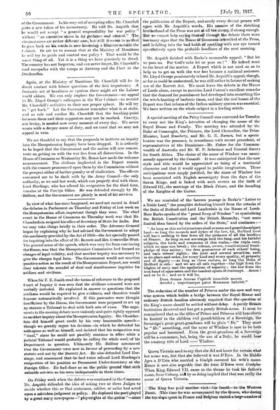WhenSir F. E. Smith read the termsof reference to the
proposed Court of Inquiry it was seen that the civilians censured were not 'verbally -included. • Ho explained in answer to .questions that the civilians would be- required to give evidence, and therefore would hocome automatically involved. If -this guarantee- wore thought inaufficient by the House, the Government were prepared to act up by etatate, a Tribunal to deal with both seta of cases. The argu- ments in the ensuing debate were violently and quite rightly opposed so ameither inquiry about the:Mesopotamian Inquiry. Mr. Chamber- lain did himself great credit by -his -very honourable speed:i- t-hough we-greatly regret his decision—in which: he defended his colleagues as welbas himself, and insisted that his resignation was ".final," since .he could not possibly continue in office while a judicial Tribunal would probably be calling the whole work's:of his Department in question. Ultimately Mr. Balfour announced that the Government were now.ha fen-our of proceeding hy a new etatute.and not -by the Barrett Act. .lie also:defended Lord Mar- siMgc, and announced that -he bad twice refused hoed Ifeadinge's vasignation of -his position as. Permanent Under...Secretary at the Foreign Office. Ile had,done so on the:public ground that snob valuable sareiceo as hia.were indispensable-in these times.


























 Previous page
Previous page